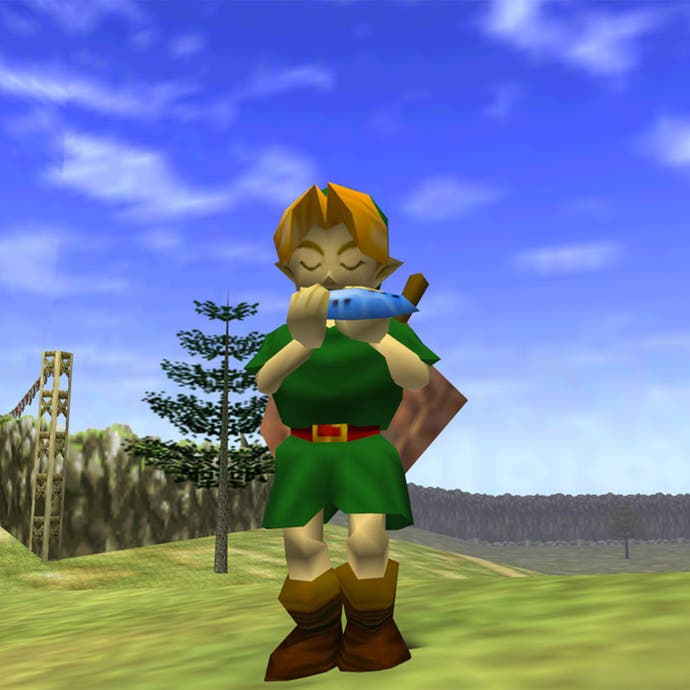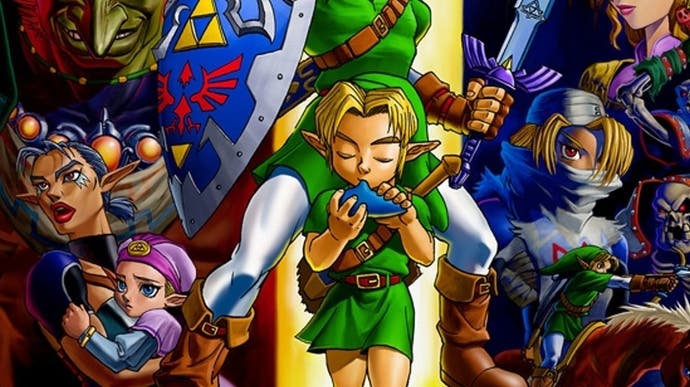Music Week: The Legend of Zelda sent me on a musical quest
Take this!
Hello! Welcome back to Music Week. Aamir Mehar explains how Zelda did for him what Chopin couldn't.
I've come across so much great music in the video game medium. Darren Korb and Ashley Barrett created beautiful and reflective work for Transistor, and while I have yet to play Chrono Cross, the tracks I've heard from it (by Yasunori Mitsuda) are dazzling. Nobuo Uematsu's work for Square has stayed with me to this day: Roses of May is as charming a tune as its name implies, while there is a menace to Succession of Witches and a subtle, disturbing feel to Listen To The Cries of the Planet.
While I liked music, I never really tried to actually play it myself; I had no real experience with instruments outside of music classes in school, lessons that never caught my interest for even a quarter beat. Perhaps the only detail that stuck with me, when it came to instruments, was my sister learning to play a simplistic portion of Aerith's Theme on her keyboard at home, and then teaching me to play it.
Oddly, I still remember the sequence of notes now, many years later. There were twelve in total, starting at the far right end of the board: C-B-A-G / D-D / D-E-F-E-D-C. That was the extent of what I could 'play', and this didn't even begin to change until just a few years ago, when I decided to finally try the 3DS port of one of the most celebrated games ever made - The Legend of Zelda: Ocarina of Time.
The game features an intriguing mechanic where you must play certain notes on an ocarina - a real instrument - using console buttons. You only needed to press them each briefly, but if you chose to hold any of them down, you could (if I recall correctly) elongate the note. I would play the pieces differently sometimes, stretching some notes, or using different timings, and I realised something that probably occurred to most children during their first instrument lessons - I could play the same piece in very different ways. There was a creativity to it and self-expression even when you were working within the framework of a tune that had been composed by someone else. Shigeru Miyamoto, the producer of the game, has actually spoken about his interest in combining music and video games, referring to the idea of introducing people to the experience of playing music in a convenient fashion. While he was talking about the Wii, it seems as if this same desire was already evident in Ocarina of Time.
For the first time in my life, I felt a strong desire to play music rather than simply listen to it. I wanted to play the gorgeous opening theme to Ocarina of Time (by Koji Kondo), a track which felt calming and yet simultaneously sorrowful. I wanted to play everything I admired, whether it be from Nobuo Uematsu or Yasunori Mitsuda, or even a composer outside of games, like Howard Shore. I had, and still have, genuine respect for classical music by the likes of Chopin, Beethoven, and so on, but I had no personal connection to their music. When I thought of playing their work, I felt intimidated but interested. When I thought of playing my favourite music from video games I felt actual excitement.
Getting a music teacher wasn't a practical idea due to the costs, so I attempted to learn by myself, starting with music theory. I still have a copy of the notes I made at the time; there are a lot of the basic references to dots and ties, notes and rests, semitones and clefs. Buying a good beginner's digital piano (with the full 88 weighted keys) would have involved spending hundreds of pounds, which ruled that option out. I settled for a 61 key and unweighted keyboard instead. It wasn't glamorous - the keys felt thin and crude, but it was a working instrument that I could use to try and learn how to play pieces, with the help of an instructional book and Youtube.

It took time, but I was able to get a very basic grasp of some of the fundamentals. I was even able to play a very simplistic version of When the Saints Go Marching In, one of the very few tunes that I actually recognised in my instructional book. I learned about what the book called 'jumps', where my fingers had to hop to another key, much as Link could bounce laterally to either side during combat. But having to pick up and do all of this at once - reading the sheet music, memorising where each key was, struggling to play with both hands, grasping the tune - was tougher than most things I usually tried.
The truth is that I've always avoided entering fields that are alien to me; when I was younger I would even give up on things that I believed I had little talent in. I've become a bit more courageous about this as I've grown older, but it's still a tricky thing to confront. I recently read a fascinating memoir by a violinist (Min Kym's Gone: A Girl, a Violin, a Life Unstrung), and it serves to reinforce just how different the world of music is to what I have experienced throughout my life. Min Kym writes about music and instruments with such a potent investment and awareness, and notes how stopping to think while playing never worked out. Stopping while playing was essentially all I could do. (Obviously I was a complete beginner, and Kym was most likely referring to the expert level player.)
But getting back to where I left off - I reached a point where learning was more and more taxing. Everything I attempted would feel slow and awkward. I abandoned my keyboard. Every couple of months, family members would shake their head and remind me about what a waste it had been, and I would insist that I would eventually go back to learning. They didn't believe it, and I can't blame them, because these months piled up and became years.
Now here we are in 2021. Unlike Link, who returned to Hyrule after seven years, it has only been about four years in my case. The other day I removed the protective foam over the keyboard, switched the power back on, and tried to play a few notes. The keys felt dirty and dusty, and I couldn't even remember the proper positioning for my fingers. With the help of internet sites and videos, however, I'm getting back just a little of what I originally had. (Which, of course, was very little in itself.) I've learned a few notes from the opening of the theme from Ocarina of Time, and while it doesn't sound anywhere near as nice as I'd like, I can hear traces of the tune in my playing. Maybe there's still time to complete this adventure.











